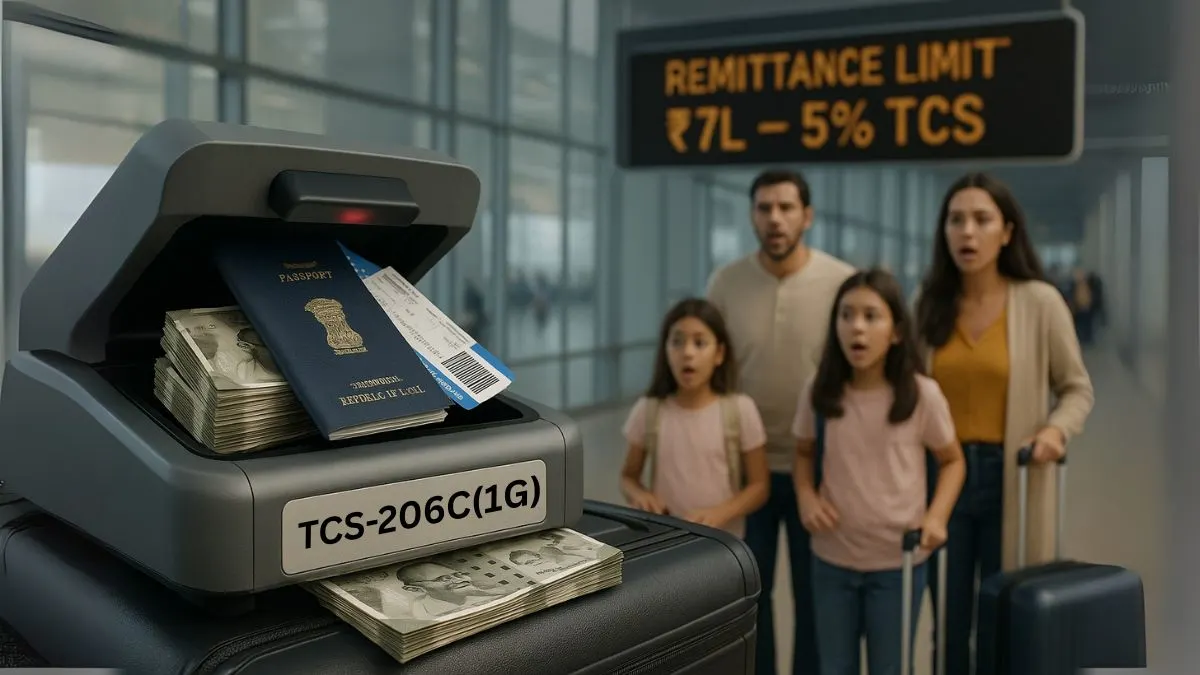
With globalisation & rising cross-border financial activity, Indian tax authorities have sharpened their claws to ensure no income slips through the cracks. That’s where Section 206C(1G) of the Income Tax Act comes into play. Whether you're a student going abroad, a parent sending money overseas, or a travel agency selling international holiday packages, this section affects you.
Let’s decode what Section 206C(1G) means & how it impacts your transactions.
💡 What is Section 206C(1G) of the Income Tax Act?
Section 206C(1G) governs Tax Collected at Source (TCS) on:
- Foreign outward remittance, &
- Sale of overseas tour program packages.
Simply put, this section ensures that people who send money abroad or book foreign travel don't escape the tax radar. It requires tax to be collected by the person receiving payment (like banks or tour operators) & then deposited with the government.
This provision was introduced through the Finance Act, 2020, & is applicable under the Income-tax Act, 1961.
🔍 Understanding Section 206c(1g)(a) & 206c(1g)(b)
Section 206C(1G) has two main parts:
- Section 206c(1g)(a): Applies to authorised dealers (like banks or financial institutions) who receive an amount for foreign outward remittance under the Liberalised Remittance Scheme (LRS).
- Section 206c(1g)(b): Applies to sellers of overseas tour packages, who are responsible for collecting TCS at the time of sale.
This split is important, as different conditions, thresholds, & TCS rates apply based on the transaction type.
📊 TCS Rates under Section 206C(1G)
Here’s how the TCS works in practical terms:
💼 1. Foreign Outward Remittance – 206c(1g)(a)
- If the remittance is for education, funded by an education loan from a financial institution, TCS is 0.5% on the amount exceeding ₹7 lakh."
- For other remittances (like investing, gifting, sending money to relatives abroad), TCS is 5% on the amount above ₹7 lakh.
✈️ 2. Overseas Tour Packages – 206c(1g)(b)
- TCS is 5% of the total value of the tour package.
- No threshold here – even if it’s ₹50,000, TCS applies.
📜 Section 206C(1G) Amendment History
Since its introduction, Section 206C(1G) has undergone multiple amendments. The Finance Acts of 2020, 2021, & subsequent clarifications by the CBDT have refined their scope.
Amendments also included:
- Reducing TCS rates temporarily due to COVID-19.
- Clarifying that educational loans are treated differently.
- Separating 206c(1g)(a) & 206c(1g)(b) for specific compliance.
Looking for a section 206c(1g) of the Income Tax Act amendment PDF? Most finance portals & tax blogs host the updates issued by the government post each Union Budget.
💰 Who Collects the TCS?
- In foreign remittances, your bank or an authorised dealer collects it.
- In case of tour packages, the travel agent or seller collects it.
They must deposit this TCS with the government & mention it in your Form 26AS, so you can claim credit while filing your ITR.
🎓 Special Rule for Educational Loans
A much-needed relief: If you’re remitting money for overseas education through a loan from a financial institution, the TCS rate is just 0.5% beyond ₹7 lakh.
But if you're self-funding it or sending for any other reason? The 5% rate applies. That’s a significant difference—and one that’s often misunderstood."
⚠️ What If You Don’t File ITR?
If you haven't filed your Income Tax Return (ITR) for the previous year, or if you're a non-filer, then higher TCS/TDS rates can kick in under Section 206CCA. But that's a story for another blog 😉
📖 What Does the Bare Act Say?
The bare act of section 206c(1g) talks in legal language about the responsibilities of sellers, authorised dealers, & thresholds. But in essence, the rule is this: if you’re spending a large sum abroad or booking a trip outside India, the government wants its tax cut first.
📆 Section 206C(1G) & Assessment Year (AY) 2020 Onwards
The rule became effective from October 1, 2020, impacting transactions for:
- AY 2021-22 onward,
- With continued applicability in AYs 2022–23, 2023–24, & so on.
If you're checking compliance for section 206c(1g) of the Income Tax Act 2020, remember, banks have been collecting TCS since FY 2020-21 under this section."
🧾 Final Thought – Why This Section Matters
India has seen a sharp rise in foreign remittances. Section 206C(1G) ensures the government doesn't miss its share of tax from these high-value transactions. Whether you're an authorised dealer, a tour operator, a student, or a parent sending funds abroad, understanding this law is no longer optional.
It affects your cash flows, ITR refunds, & can create unnecessary confusion if not planned for in advance.
At Callmyca.com, we help individuals & businesses file TCS reports, claim refunds, & ensure full compliance with Section 206C(1G) of the Income Tax Act—without the stress or confusion. Click now to get started before you make your next foreign transaction!











